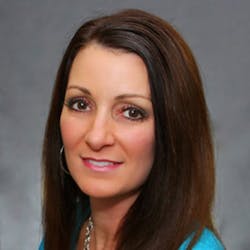Like many healthcare organizations, Raleigh Medical Group, an internal medicine and gastroenterology group with four main and 11 satellite locations, has been challenged with finding the most efficient way to exchange patients’ clinical records with other providers with the aim of quickly closing the loop on patient care.
As a member of the WakeMed Key Community Care accountable care organization (ACO), the medical group was an early adopter in early 2012 of a Software-as-a-Service (SaaS) referral coordination solution, specifically Infina Connect’s Intelligent Care Coordinator solution, to enable electronic referrals among the ACO provider members.
“Using Infina for our referral processes, we were essentially exporting documents out of our electronic health record (EHR) and then attaching them electronically and then importing them to the website. But we couldn’t send the documents directly from our EHR,” Kelly Crisp, director of health information and technology at Raleigh Medical Group, says.
Kelly Crisp
Crisp says the medical group’s electronic medical record (EMR) system was enabled for direct messaging, yet the question remained if other providers in the Raleigh area had the same technology and would be able to receive the direct messages.
“We try to stay on the forefront of technology, however, you’re only as good as the recipients of those direct messages, so we had some challenges there,” Crisp says.
Crisp and Sujatha Raman, M.D., an internal medicine physician and Raleigh Medical Group’s lead technology physician, have been proactive about adopting new health IT solutions to not only improve efficiencies in healthcare delivery but also as part of the medical group’s meaningful use attestations. In addition to wanting better care coordination for patients in collaboration with referred specialists, Crisp and Dr. Raman knew that electronic referrals that could send clinical documents directly from the EHR would help the medical group meet requirements for MU Stage 2, objective 15, measure 2. That measure requires healthcare providers to electronically transmit a continuity of care document (CCD) to at least 10 percent of their referrals by using certified electronic health record technology (CEHRT) or eHealth Exchange transmission.
Sujatha Raman, M.D.
“We knew that measure was coming down the pipe,” Crisp says. “So, knowing that 70 percent of our referrals were done through Infina, we started having conversations with Infina about a year ago about the ability to do direct messaging. The head of IT at Infina and I spent some time looking at how that solution would work.”
A month ago, Infina Connect released its ICC Direct application and Raleigh Medical Group quickly deployed the application to two of its four locations. ICC Direct is an enhancement of Infina’s ICC solution and enables physicians to automate the creation of ICC referrals from any certified EHR and electronically exchange clinical documents with other providers, even if each provider has a different EHR system.
According to Mark Hefner, Infina Connect CEO, ICC Direct leverages both the secure messaging capability built into all 2014 edition certified EHRs and access to the Surescripts Clinical Direct Messaging solution via the nation’s largest health information network.
Healthcare providers have been struggling to share information electronically due to technology systems that are unable to easily communicate with each other, and many providers specifically have had difficulty meeting the 10 percent electronic transmission requirement as outlined in MU Stage 2, objective 15, measure 2, according to Hefner.
He says the ICC Direct solution was designed to enable both referral partners to exchange documents throughout the referral cycle, even if the consulting physician does not have Direct messaging, is not using an EHR or is not an ICC subscriber. An application like ICC Direct also reduces the need for investments in interfaces, integrations and private health information exchanges (HIEs) to exchange clinical information, he adds.
“I can’t tell you the anxiety that we felt when we had that 10 percent electronic measure come up with meaningful use,” Dr. Raman says. “By implementing ICC Direct, it will enable us to get that measure accomplished. We’re also a patient-centered medical home and we have certain measures we have to fulfill so it helps us with that as well.”
According to Hefner, since rolling out the ICC Direct application, Raleigh Medical Group will likely achieve the 10 percent requirement in 10 days out of its 90-day reporting period for meaningful use.
“They are actually more than 10 percent electronic transmission and they are doing it over a shorter period of time and still hitting that certification criteria of 10 percent,” he says.
“At the end of the day, it’s about providing better patient care and this truly does help us get things done in a more efficient manner,” Dr. Raman says. “We need referrals to take care of our patients with specific conditions and this electronic exchange enables expeditious communication back and forth.”
She points out that ICC Direct connects the exchange of clinical documents to the referral workflow, so physicians maintain visibility into their patients’ status and can provide closed loop care coordination.
“So, if I order a specific test for a patient’s diagnosis and then refer the patient to a gastroenterologist, that gastroenterologist would be able to see the tests that I ordered, so it eliminates duplication. And the specialists can see all the data I’ve collected, which can help them come up with a better treatment plan. And then I get the data back, so we’re all in the same loop,” she says.
Crisp says there were only minor workflow integration changes when she rolled out the ICC Direct implementation at the group’s Cary Medical Group and Raleigh Medical Group locations.
“In terms of the workflow, it’s very straightforward. We already had a referral workflow, but this just cuts out some of the steps, which saves time, reduces overhead and with regard to patient privacy, the documents go directly out of our EHR, which is hosted in a cloud solution and it’s very controlled, so we feel good about that,” Crisp says. “We look for processes and applications that provide efficiencies that enable physicians to see more patients, and we’re all bout technology as a way to improve those efficiencies.”
“Long term,” Crisp adds. “we’re looking at more efficiency and less time to send referrals and patient records. Ultimately, this helps our physicians provide better care because we’ve sped up the process so physicians get the information more quickly and can make quicker treatment decisions.”




